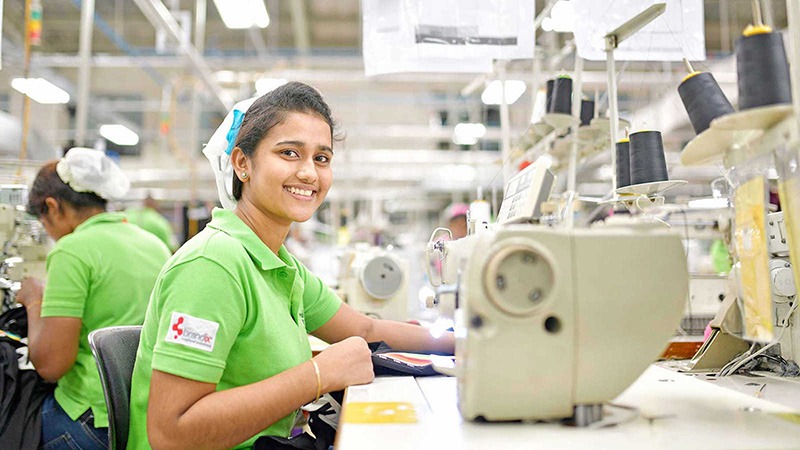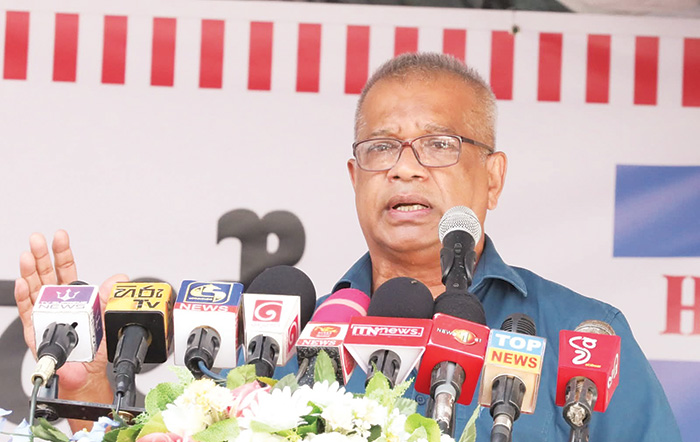Business
Smallholders hold the key to productivity in Sri Lanka’s tea industry

Recipe for reform:
By K.L Gunaratne (chairman, Sri Lanka Federation of Tea Smallholders)
With nearly 500,000 smallholders in total, the tea smallholder sector is a significant contributor to the production and output of Ceylon Tea in Sri Lanka, and across the globe. We are often called the ‘backbone’ of our tea industry, and with good reason.
16% of Sri Lanka’s arable land belongs to the tea sector. Of this, tea smallholders operate in 60% of the total tea land and account for more than 70% of the total tea produced. According to the Tea Control Act, tea lands between 20 perches and 10 acres are considered “Tea Small Holdings” across the country.
I am a tea smallholder myself. My journey began in 1977 with a 2-acre tea land. I now operate three small tea lands while simultaneously serving as the chairman of the Sri Lanka Federation of Tea Smallholders. Running a smallholding over the past three decades (or more) has not been an easy feat. No matter how big or small your tea plot is, ensuring that the land is well managed, tea is correctly harvested, and the quality of Ceylon Tea is upheld are challenging standards to meet every day.
 Currently, a great deal is being made about the tea industry and tea companies being in hot water over concerns on wages, productivity, output, and quality. As such we felt it was important to share lessons from a tea smallholder perspective to help refine best practices and discover a sustainable way forward. It is essential that the industry – as a collective – ensures a paradigm shift in the way we’ve been managing this sector. While it is true that the industry was introduced by the British in 1867, the challenges we face today are totally different from then, and there is no reason as to why our management practices should not evolve with the times.
Currently, a great deal is being made about the tea industry and tea companies being in hot water over concerns on wages, productivity, output, and quality. As such we felt it was important to share lessons from a tea smallholder perspective to help refine best practices and discover a sustainable way forward. It is essential that the industry – as a collective – ensures a paradigm shift in the way we’ve been managing this sector. While it is true that the industry was introduced by the British in 1867, the challenges we face today are totally different from then, and there is no reason as to why our management practices should not evolve with the times.
Basic industry dynamics
Tea smallholder plantations are found commonly across the island. Most low-country tea comes from plantations in Ratnapura, Galle, Matara and Kalutara. Mid-country smallholdings are widespread across, Kegalle and Kandy. Up-Country tea comes from Nuwara Eliya and Uwa. A majority of tea smallholders are both managers and harvesters of their lands. Small tea plots are easy to manage, and if you own one, you and your family will likely tend to it. The larger the tea plot, the more decentralised management becomes – quite similar to the basics of how the much larger tea companies function. However, unlike the big tea companies – widely known as Regional Plantation Companies (RPCs) – smallholders are not bound by a ‘Collective Agreement’ when it comes to the matter of worker compensation. Sri Lanka’s Industrial Disputes Act of 1950 defines the ‘Collective Agreement’ as an agreement relating to the terms and condition of employment of workmen in any industry. Within the tea industry, this agreement mainly focuses on worker remuneration and is renegotiated every two years.
With wage negotiations approaching early next year, industry actors across the board seem to be at cross-roads on the best way forward. The only point on which there seems to be much agreement is that reform is needed and urgently. This is a battle fought every two years, and unfortunately, there are no winners; only losers. By contrast, smallholders like us who are not bound by such an agreement have the independence to make decisions we feel are best for our workers, the industry and the legacy of Ceylon Tea.
While we use the Collective Agreement as a benchmark for the rate of payment, we have one crucial advantage, which is that we have the freedom to decide on the model of payment. For us, the Collective Agreement is only a guideline. Our main focus is therefore in ensuring that we are able to offer workers a method of payment that is attractive, while still remaining sustainable as a business.
Lesson from tea smallholders
Here’s how we work: As a baseline, tea harvesters are paid a rate of Rs. 30 for every kilo they harvest. Some harvesters pluck up to an average of 30 kgs on a good day. A good day is when the weather, the soil and harvesting practices are all in our favour. Leaves on each tea bush are harvested on rotation every 7-10 days. This means that leaves from each bush are plucked at least three times a month. A tea plot needs more than just the expertise of tea harvesters to yield a successful output. Besides tea harvesters, we also have other fieldworkers who engage in manual labour oriented tasks like weeding, manuring and up-keeping estate infrastructure who are paid a daily wage of Rs. 1000. These fieldworkers work 8 hours a day.
As illustrated above, for tea harvesters, our method of payment is far from an unrewarding, fixed daily wage model. Instead, each harvester is paid for the kilos of tea they yield – which is to say: a productivity linked model of remuneration.
Until the 2000s, like the RPCs, tea smallholders also paid harvesters and tea workers a daily wage. However, we found that this became a real challenge when trying to retain workers and maintain profitability, and so a collective decision was taken by tea smallholders to shift towards a productivity-linked wage, as we saw this to be far more efficient and effective for the industry.
Speaking from direct personal experience, the ability to remunerate tea harvesters based on output has been liberating for them and for myself. While this has helped me manage my tea lands better and yield higher output, it has also given me the time to venture into other areas of work I am passionate about. For instance, I was able to pursue my passion of setting up the National Pre-School Development Foundation; this foundation aims to train pre-school teachers in Early Childhood Development within plantation communities. For tea harvesters, moving out of a daily payment system has opened up a path for them to secure higher earnings while increasing mobility of labour – meaning that workers were freed up to actively pursue work on different smallholder plots in order to boost their earnings even further.
Over the past few years, tea harvesters who work on smallholder plots have evolved into entrepreneurs themselves. Driven by the need to improve efficiency and output, harvesters themselves have become ‘agents of change’. Management and production practices have become smarter, output-oriented and have resulted in improvements in the quality of the tea leaf itself.
A recent study by the International Labour Organisation confirms these observations which I have personally witnessed over the years as a smallholder, namely: that casual workers engaged in tea smallholdings usually earn a higher daily wage compared to the plantation workers and contribute towards more productive work (Future of work for Tea Smallholders in Sri Lanka, ILO, 2018). This is simply due to the fact that the people we contract to work on our plots are paid solely based on their productivity.
Over the years, although the tea smallholder sector has evolved to suit the times, it is unfortunate that the rest of our industry has been held back from progress by forcing the continuation of a basic wage system that does not prioritize or sufficiently reward productivity. RPCs continue to play an important role in our industry – particularly in terms of upholding the international image and reputation of Ceylon Tea through their commitments to securing international standards and certifications.
Hence it is essential that the RPCs are able to continue operations in a sustainable manner. A collapse in the RPC sector would create major risks to the entire industry’s reputation for the highest quality standards and its capacity for innovation – given that more recent advancements in mechanization, climate-friendly factories, use of drone technology and IT to optimize production and supply chain have only been made possible due to their investments. Such advancements can only be scaled down to provide benefits to tea smallholders once a path to implementation has been cleared by RPCs. Failure to facilitate this progress will ultimately jeopardize the sustainability of the entire industry.
Moreover, the first and most pressing solution to this dilemma is obvious to all parties. The wage model must be revised. Our experience as tea smallholders is clear proof of this fact and should not be lightly disregarded. We are all advocates of our tea, and what hurts one sector of our industry will ultimately impact all of us. A paradigm shift is necessary, and it can only start with a long-overdue update to the way in which, workers are paid.
(The writer is the chairman of the Sri Lanka Federation of Tea Small Holders. The Federation of Tea Small Holders is an industry body aimed at promoting the advancement and development of tea smallholdings in the country. In 2018, tea smallholders contributed more than 70% of the overall tea production in the country.)
Business
Sri Lanka’s economy: A slow healing journey in 2026

The latest Purchasing Managers’ Index (PMI) from the Central Bank suggests Sri Lanka’s economy is beginning to find its feet after a severe crisis, revealing tentative signs of hope in factories and business activity. It indicates the deepest economic pain may be over. With prices rising more slowly, families and companies are getting some much-needed relief.
The Island spoke to an independent analyst for an outside perspective. Elaborating on the report, he struck a cautious note: “Yes, the PMI sounds favourable. But no one should think the hard times are completely behind us. The road to recovery is long and full of potholes.”
“While we can hope for slow, steady improvement in coming months, major problems remain,” he continued. “The country’s massive debt is a heavy burden. Staying on track with the IMF programme requires sticking to tough reforms, which won’t be easy. Global economic uncertainty also affects our exports and even other forms of external support.”
“In short, the next phase won’t be a quick boom. It will be a time for careful repair. These small improvements are like young seedlings – they need constant care, sound policy, and continued external support to grow strong. Our task is to turn this shaky stability into a solid foundation for lasting, inclusive growth. The economy is out of emergency care, but full recovery will be a long and patient journey,” he concluded.
When asked if the current political landscape would aid recovery, he pointed to the present stability as a key advantage. “With political stability in place, the path for necessary reforms and recovery should be more navigable now than ever in the past,” he said.
By Sanath Nanayakkare
Business
Sri Lanka Insurance Corporation General Limited inaugurates business operations for 2026

Sri Lanka Insurance Life Ltd and Sri Lanka Insurance General Ltd inaugurated their business operations for the year 2026 on 1st January at the Sri Lanka Insurance Head Office. The event was graced by the Chairman, Board members, Corporate Management, and staff of SLIC.
Parallel business launches were also conducted at branch level, with branch staff joining the head office proceedings via live stream. The day’s programme commenced with blessings observed from the four major religious faiths, symbolising unity and goodwill for the year ahead
Heralding the dawn of the New Year, SLIC brought together all 142 branches in a cohesive celebration, uniting as one family to light the traditional oil lamp. During the celebrations, the theme for SLICGL for 2026 ‘Leading the market, strengthening every step’ was officially unveiled
Celebrating 64 years of service and expertise, SLIC continues to stand as Sri Lanka’s most respected and trusted name in insurance. Over the decades, the organisation has remained at the forefront of the sector, sustaining industry‑wide growth and equity even through testing times.
The year 2025 brought many meaningful and positive achievements for SLICGL, yet it concluded with significant challenges as the nation faced the aftermath of the devastating Cyclone Ditwah. Rising to the occasion, SLICGL honoured claims and delivered timely relief, offering protection and reassurance to communities impacted by the catastrophe.
SLICGL proudly reflects on a year of remarkable achievements in 2025. The organisation was ranked
Sri Lanka’s highest-rated insurance brand as the only A+ Fitch rated insurer in the country and became the first and only insurer to surpass Rs. 30 billion in Gross Written Premium. SLICGL secured Carbon Neutral Certification, highlighting a commitment to sustainability. SLICL was also recognised as the Most Valuable General Insurance Brand by Brand Finance.
The lifting of the vehicle import ban in January 2025 helped to revitalize the automotive sector and also reaffirmed SLICGL’s role as the nation’s most trusted insurer. Stepping in to protect new vehicle owners, SLICGL strengthened its portfolio, supported national growth, and supported families and businesses to move forward with confidence.
During 2025, SLICGL continued its partnership with the Ministry of Education on the Suraksha Insurance Scheme, a national initiative aimed at securing the health and wellbeing 4.5 million schoolchildren throughout the country. The partnership provides students regardless of background, access to essential insurance coverage, safeguarding health, supporting families, and strengthening the nation’s future.
SLIGL’s mission places customers at the heart of everything it does. The organisation continues in the commitment of meeting and exceeding customer expectations through its expertise and specialised services. Aligning business strategies with this vision, SLIC delivers a superior customer experience through all touchpoints.
Business
MILCO turns around fortunes, posts Rs. 1.49 bn record profit in 2025

The Milk Industries of Lanka Company (MILCO) has recorded the highest profit and sales revenue in its history, driven by strong performance under the flagship Highlands brand, Agriculture Minister Lal Kantha said.
Addressing a Performance Incentive Awards Ceremony held at the MILCO Head Office in Narahenpita on December 31, the Minister said the achievement marked a decisive turnaround for the state-owned dairy enterprise, which had earlier been prepared for divestment.
“When we assumed office, MILCO was being readied for sale. Today, we have been able to rescue it and transform it into a profitable institution,” Minister Lal Kantha said. “By October 2025, the company had generated profits amounting to Rs. 1,490 million, the highest profit ever recorded in MILCO’s history.”
He noted that 2025 has also become the year with the highest sales revenue since the company’s establishment, reflecting improved operational efficiency, renewed consumer confidence and stronger market penetration under the Highlands brand.
The Minister said the government intends to ensure that the gains from the company’s financial recovery are shared across the value chain. “A portion of the profits will be distributed as incentives among dairy farmers,” he said, adding that plans are also in place to provide free life insurance coverage to 15,000 dairy farmers in 2026.
The incentive awards ceremony was organised to recognise employees who played a key role in achieving record sales targets and historic profitability, with senior management highlighting improvements in production planning, supply chain management and farmer engagement.
Minister Lal Kantha paid tribute to the dedication of the MILCO workforce, stating that the turnaround was the result of collective effort.
“This achievement belongs to everyone who worked tirelessly to restore confidence in this institution. I extend my sincere appreciation to all those who contributed to this success,” he said.
MILCO’s performance in 2025 is being viewed as a benchmark for the revival of state-owned enterprises, particularly within Sri Lanka’s agri-based industrial sector.
By Ifham Nizam
-

 Sports4 days ago
Sports4 days agoGurusinha’s Boxing Day hundred celebrated in Melbourne
-

 News2 days ago
News2 days agoLeading the Nation’s Connectivity Recovery Amid Unprecedented Challenges
-

 Sports5 days ago
Sports5 days agoTime to close the Dickwella chapter
-

 Features3 days ago
Features3 days agoIt’s all over for Maxi Rozairo
-

 News5 days ago
News5 days agoEnvironmentalists warn Sri Lanka’s ecological safeguards are failing
-

 News3 days ago
News3 days agoDr. Bellana: “I was removed as NHSL Deputy Director for exposing Rs. 900 mn fraud”
-

 News2 days ago
News2 days agoDons on warpath over alleged undue interference in university governance
-

 Features5 days ago
Features5 days agoDigambaram draws a broad brush canvas of SL’s existing political situation













